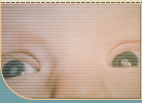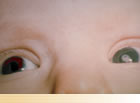
Welcome from Dr. Scott Lambert
Principal Investigator, IATS
The IATS is closed to enrollment; study administrators are continuing data analysis and supplemental publications. The general results of the study are reported on the IATS home page of this website.
 Hello! My name is Scott Lambert. I am a professor of ophthalmology at Emory University in Atlanta Georgia and the Principal Investigator for the Infant Aphakia Treatment Study or IATS. I am delighted that you are interested in hearing about this clinical study.
Hello! My name is Scott Lambert. I am a professor of ophthalmology at Emory University in Atlanta Georgia and the Principal Investigator for the Infant Aphakia Treatment Study or IATS. I am delighted that you are interested in hearing about this clinical study.
IATS has been funded by a government body called The National Eye Institute and is being conducted in 12 cities in the U.S. This study seeks to determine the optimal treatment for an infant born with a cataract in one eye. Two treatment types are being compared. One is cataract removal with a replacement lens placed inside the eye and glasses. The other treatment is cataract removal and a contact lens. We know from past experience that both treatments work well. What we want to determine is if one treatment works better than the other one.
This study is a randomized clinical trial. Your child will be randomly assigned to receive one of the two treatments. Random means by chance, like the flip of a coin. Neither you nor your surgeon will know the type of treatment until it is randomly assigned at the time of the cataract removal surgery. While it may feel uncomfortable not being able to choose the treatment your child will receive, this study would not be done if we did not believe that both treatments are safe and both work well.
You may be assured that your child will receive high quality treatment by surgeons who are leaders in their field. Your child's care will be given additional oversight by the National Institutes of Health, the Food and Drug Administration, and a specially appointed board of scientists and eye experts. This study offers education and support for parents through challenging times. As a study participant you will be helping to advance the treatment of this condition which will help many children in the U.S. and other countries throughout the world.
This web site features background information on congenital cataracts, a discussion by Dr. Edward Wilson from the Medical University of South Carolina, and a list of study sites with contact telephone numbers.
Participating in a clinical research study deserves careful consideration. Regardless of what you decide, all of us on this study team wish you and your baby the very best.
Thank you.
